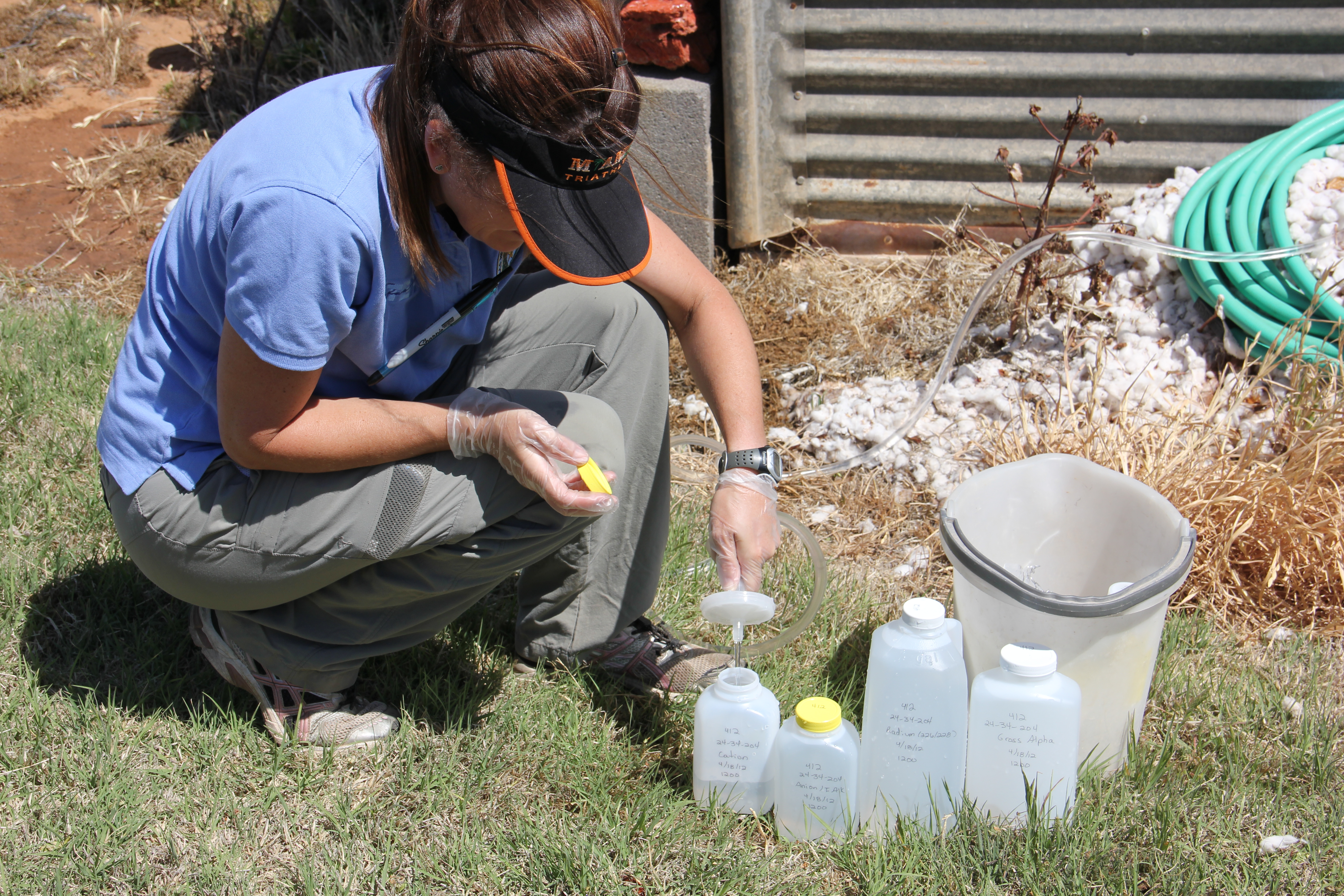Resources for Sampling Private Water Wells
How Do I Test My Well?
A water testing or environmental laboratory can analyze a water sample from your water well. The Texas Commission on Environmental Quality (TCEQ) has developed a laboratories map and laboratory map table of the NELAP accredited drinking water public laboratories across the state of Texas. This map shows Texas drinking water public laboratories that offer testing for microbial total coliforms, lead and copper, and/or water quality parameters. When using the map, match the number to the PWS Laboratory Map Table to find more information about the lab, such as what they test. Always call laboratories to confirm their address, sample drop off hours, and prices.
What Should I Test For?
The EPA Private Drinking Water Wells website has a section that helps you identify what to test for in your well based on conditions or nearby activities. Click on "Testing your private water well" under the "Protect Your Well" section of the website.
This Well Water Testing document provides guidance on water well testing. The analyses listed under the "LCRA Environmental Lab Services" section show typical analyses private well owners might run.
Additionally, the TWDB routinely samples a representative number of wells and springs from each of the state's nine major and 22 minor aquifers to establish baseline water quality conditions. To further assist you in your decision making process, you can review the results of these samples in your area from our Water Quality by County reports page.
How Much Will Sampling Cost?
Costs can range from $20 to test for presence or absence of coliforms and E.coli bacteria, and up to $400 for a full drinking water standards analysis. Most labs should provide the ability to request a quote before ordering a sampling kit.
Some groundwater conservation districts (GCDs) perform well water testing for free or at a reduced cost. You can enter your address in the GCD Index to see if you fall within the jurisdiction of a GCD and if they perform water well testing.
The TWDB's Groundwater Monitoring program occasionally has funds available for sampling private water wells on a case by case basis, but the anlyses performed are limited to constituents that occur naturally, major ions and trace minerals, and does not include bacteria (coliforms) or other introduced pathogens. If you would like to be added to the list for possible sample collection in the future as part of our water quality sampling program, contact the Groundwater Monitoring Manager, Rebecca Storms, and please include specific information on your well specs and property location.
How Do I Know If There's A Problem With My Well's Water Quality?
The TWDB has prepared the Guide to Understanding Your Water Quality Analysis Report to help you examine and understand the results of a water quality analysis of your water well.
TWDB is not a regulatory agency and provides this information as a service to Texas citizens. Additionally, the State of Texas does not regulate the water quality of private water wells, and as a well owner, you are responsible for addressing any water quality problems, but please feel free to contact our staff to answer any questions you might have about groundwater or your analysis at (512) 936-0862.
How Do I Treat Contamination Of My Water Well?
There are several methods of treatment depending on the type of contamination you are experiencing in your water well. The Texas Well Owner Network Well Owner's Guide to Water Supply contains useful information, including sections on water quality, common contaminants, water quality testing, and water treatment options (see chapters 7-10).
Some common issues private well owners have, and links to documents about treatment options are listed below.
Prevention
How Is Pesticide Contamination of Private Water Wells Prevented?
Well Treatment
How to Disinfect a Private Well System in 7 steps
Disinfecting Your Private Water Well (TCEQ)
Centers for Disease Control and Prevention (CDC) Guidelines for Well Treatment
Cleaning wells after seawater flooding
Specific Contaminants
What to Do About Coliform Bacteria in Well Water
Drinking Water Problems: Arsenic
Other Issues
Hydraulic Fracturing Brochure for Water Well Owners
How Do I Report Contamination?
To report unauthorized discharges or spills contact the Texas Commission on Environmental Quality State of Texas Spill-Reporting Hotline within 24 hours after occurrence at 1-800-832-8224.
If a driller notices oil or other contamination while drilling a well they will need to report that to the Texas Department of Licensing and Regulation by filling out the Report of Injurious Water or Constituents Form and emailing the completed form to water.well@tdlr.texas.gov
Additional Helpful Links
Guidance for testing private water well for VA loans - Additional information for how to meet water well testing requirements when purchasing a house using a Department of Veterans Affairs (VA) backed loan.
Groundwater Database Reports - Reports designed to view a select set of information in the TWDB Groundwater Database. The Water Quality Reports section allows you to search water quality data by Aquifer or County or for a Specific well
TWDB Groundwater Data Interactive Viewer - Interactive mapping application that provides access to water-related data for Texas, including TWDB groundwater data, brackish groundwater data, and data from the Submitted Drillers Reports Database, which allows you to search your property location for well records in your area.
Wellowner.org provides information regarding Water Well Basics and offers free online Well Owner Lessons. They also have a Water Well Service Contractor Lookup Tool.
TCEQ's Guidance on How to Sample for Bacteria and Understand the Results
Texas Department of State Health Services (DSHS) - This is a link to their contact page where you can find their main line and call for assistance.
Texas Water Development Board (TWDB) information on Major Aquifers and Minor Aquifers
The Groundwater Monitoring department is available for additional water quality questions. Email us at Water Quality Program Coordinator
